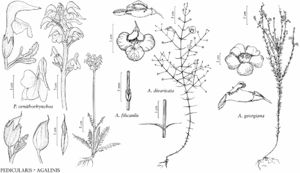Difference between revisions of "Agalinis divaricata"
Bull. Torrey Bot. Club 40: 437. 1913.
FNA>Volume Importer |
FNA>Volume Importer |
||
| Line 34: | Line 34: | ||
|elevation=0–70 m. | |elevation=0–70 m. | ||
|distribution=Ala.;Fla.;Ga. | |distribution=Ala.;Fla.;Ga. | ||
| − | |discussion=<p>Agalinis divaricata is largely a Floridian species, just entering southeasternmost Alabama and southwestern Georgia. In Florida, it is found from the Panhandle to the northern peninsula.</p> | + | |discussion=<p><i>Agalinis divaricata</i> is largely a Floridian species, just entering southeasternmost Alabama and southwestern Georgia. In Florida, it is found from the Panhandle to the northern peninsula.</p> |
|tables= | |tables= | ||
|references= | |references= | ||
| Line 58: | Line 58: | ||
|publication year=1913 | |publication year=1913 | ||
|special status=Selected by author to be illustrated;Endemic | |special status=Selected by author to be illustrated;Endemic | ||
| − | |source xml=https://jpend@bitbucket.org/aafc-mbb/fna-data-curation.git/src/ | + | |source xml=https://jpend@bitbucket.org/aafc-mbb/fna-data-curation.git/src/8f726806613d60c220dc4493de13607dd3150896/coarse_grained_fna_xml/V17/V17_958.xml |
|genus=Agalinis | |genus=Agalinis | ||
|species=Agalinis divaricata | |species=Agalinis divaricata | ||
Revision as of 16:04, 18 September 2019
Stems simple or branched, 20–50(–60) cm; branches widely spreading, quadrangular-ridged, scabridulous or glabrate. Leaves spreading to +/- reflexed at mid stem, distalmost sometimes ascending; blade linear-filiform, 10–30 x 0.2–0.6 mm, margins entire, adaxial surface glabrous or slightly scabrous; axillary fascicles absent. Inflorescences racemes, flowers 1 or 2 per node; bracts shorter than pedicels. Pedicels spreading to slightly spreading-ascending, 12–28 mm, glabrous. Flowers: calyx campanulate to funnelform, tube 1.5–3 mm, glabrous, lobes spreading, deltate, 0.1–0.5 mm; corolla pale to dark pink, rarely white, without 2 yellow lines and red spots in abaxial throat, 14–20 mm, throat glabrous externally and within across bases and sinus of adaxial lobes, lobes: abaxial spreading, adaxial projected flatly over anthers, 2.5–6 mm, unequal, abaxial 4–6 mm, adaxial 2.5–3 mm, glabrous externally; proximal anthers parallel to filaments, distal perpendicular to filaments, pollen sacs 1.4–2.6 mm; style exserted, 6–9(–10) mm. Capsules globular, 3–5 mm. Seeds yellowish brown to tan, 0.5–0.7 mm. 2n = 28.
Phenology: Flowering early Sep–mid Oct.
Habitat: Dry open pine savannas, dry oak openings, dry sandy ground, mesic flatwoods, margins of bogs and seepage slopes, dry roadsides.
Elevation: 0–70 m.
Distribution
Ala., Fla., Ga.
Discussion
Agalinis divaricata is largely a Floridian species, just entering southeasternmost Alabama and southwestern Georgia. In Florida, it is found from the Panhandle to the northern peninsula.
Selected References
None.
